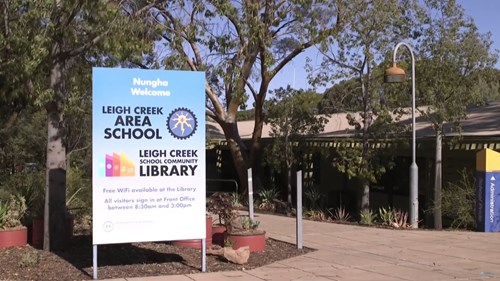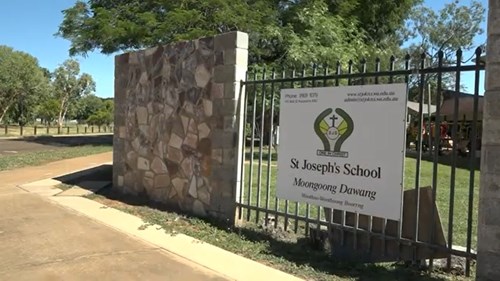Framework for Aboriginal Languages and Torres Strait Islander Languages- Language Revival Learner Pathway Years F-10 sequence
https://www.australiancurriculum.edu.au/f-10-curriculum/languages/framework-for-aboriginal-languages-and-torres-strait-islander-languages/
For the F-7 units of work illustrated:
F-2 Curriculum connections
Socialising
Interact with each other, the teaching team and visiting Elders/community members, using language and gestures to greet and talk about self and family
[Key concepts: self, family and relationships; Key processes: interacting, sharing] ACLFWC130
Participate in guided group activities, such as games, songs and simple tasks, using movement and gestures to support understanding and to convey meaning
[Key concepts: cooperation, play; Key processes: turn-taking, matching, choosing, cooperating, following instructions] ACLFWC131
Informing
Give factual information using simple statements, gestures and captions
[Key concepts: Country/Place, community life; Key processes: labelling, describing, presenting, recounting] ACLFWC134
Creating
Create and present shared stories, songs and performances, using familiar words and patterns and support materials
[Key concepts: story, performance; Key processes: retelling, singing, re-enacting, dancing, drawing, performing; Key text types: songs, dances, stories, paintings and visual design, performances] ACLFWC136
Identity
Describe aspects of self, such as family, school/class and language/s spoken, considering how these contribute to their sense of identity
[Key concepts: identity, self, family, belonging; Key processes: describing, explaining, identifying] ACLFWC139
Systems of language
Learn the different sounds of the language and link these to written symbols and conventions
[Key concepts; pronunciation, intonation, writing; Key processes: imitating, noticing, distinguishing, reading aloud] ACLFWU141
Language variation and change
Recognise that different words and language forms are used to address and communicate with people according to relationship and context
[Key concepts: kinship, context; Key processes: noticing, recognising] ACLFWU145
Years 3-6 Curriculum connections
Socialising
Interact with peers, the teaching team and visiting Elders/community members about aspects of personal worlds, such as experiences at school, home, everyday routines, interests and activities
[Key concepts: relationship, kinship, family, experience; Key Processes: describing, sharing, responding, recounting] ACLFWC152
Participate in guided tasks that involve following instructions, making things, cooperating with peers, planning for and conducting shared events, activities or school performances
[Key concepts: collaboration, planning, performance; Key processes: compiling, planning, rehearsing, making] ACLFWC153
Creating
Listen to, read and view different real and imaginative texts, identifying and making simple statements about key elements, characters and events, and interpreting cultural expressions and behaviours
[Key concepts: visual design, representation, journey; Key processes: participating, describing, predicting, recalling, responding, listening, shared/guided reading; Key text types: songs, dances, stories, paintings and visual design, video clips] ACLFWC157
Translating
Create bilingual texts for the classroom and the school community, such as songs, picture dictionaries, captions for images and displays, photo stories
[Key concepts: bilingualism, expression; Key processes: performing, describing, code-mixing, captioning] ACLFWC160
Identity
Explore their own sense of identity, including elements such as family, friends, interests, membership of groups, and consider markers of identity that may be important across all cultures
[Key concepts: identity (individual and group), kinship, community, membership; Key processes: creating, representing, discussing, comparing] ACLFWC161
Systems of language
Distinguish and produce the speech sounds of the language, understanding how these are represented in writing
[Key concepts: punctuation, upper and lower case letters, diacritics, intonation, spelling; Key processes: identifying, discriminating, noticing, listening, reading] ACLFWU163
Expand vocabulary in the language through word-formation processes and recognise and use simple language structures
[Key concepts: word formation, word class, grammatical person and number, negation, metalanguage; Key processes: noticing, comparing, applying, understanding, modifying meaning] ACLFWU164
Recognise how kin relationships link people, Place and story
[Key concepts: kinship system, ways of talking, human relationships, interrelatedness; Key processes: recognising, interpreting, discussing ACLFWU166
Year 7-10 Curriculum connections (for Year 7 units of work)
Socialising
Engage with peers, the teaching team and visiting Elders/community members to exchange information about interests, experiences, plans and aspirations
[Key concepts: experience, aspiration; Key processes: recounting, exchanging, connecting] ACLFWC174
Engage in activities that involve collaboration, planning, organising, promoting and taking action
[Key concepts: event, experience; Key processes: planning, organising, negotiating] ACLFWC175
Informing
Interpret and respond to texts by sharing personal reactions, comparing themes, describing and explaining aspects of artistic expression and how these relate to land, sky, sea, water, people, plants, animals and social and ecological relationships
[Key concepts: representation, imagination; Key processes: interpreting, explaining, describing, discussing; Key text types: songs, dances, stories, paintings and visual design, video clips, films] ACLFWC179
Translating
Translate and interpret texts from the language to English and vice versa, comparing their versions and considering how to explain elements that involve cultural knowledge or understanding
[Key concepts: equivalence, representation, meaning, interpretation, idiom; Key processes: comparing, explaining, interpreting] ACLFWC181
Identity
Consider and discuss their own and each other’s ways of communicating and expressing identity, reflecting on how the language links the local, regional and national identity of its speakers with the land
[Key concepts: identity, perspective, biography; Key processes: sharing, comparing, considering, reflecting, analysing] ACLFWC183
Systems of language
Understand and explain the sound patterns in spoken language and use developing phonemic awareness to represent these patterns in written form
[Key concepts: metalanguage, patterns, phonetic articulation, syllable; Key processes: reading, investigating, comparing] ACLFWU185
Expand vocabulary and understand and use a range of vocabulary sets and grammatical structures that are available in the language
[Key concepts: system, grammatical case, transitivity; Key processes: explaining, discussing] ACLFWU186
Investigate how the kinship system functions to integrate personal and community histories and relationships
[Key concepts: interconnectedness, human relationships, ownership, rights and responsibilities; Key processes: describing, explaining, investigating, exploring] ACLFWU188
Role of language and culture
Reflect on how ways of using language are shaped by communities’ ways of thinking, behaving and viewing the world, and the role of language in passing on knowledge
[Key concepts: Indigenous knowledge, value transmission; Key processes: reflecting, exploring, analysing, comparing]
Cross Curriculum priorities
- Aboriginal and Torres Strait Islander Histories and Cultures
The Framework for Aboriginal Languages and Torres Strait Islander Languages provides a direct way of learning about and engaging with diverse Aboriginal and Torres Strait Islander communities. Aboriginal and Torres Strait Islander Histories and Cultures are an integral part of learning Aboriginal languages and Torres Strait Islander languages as there is an inseparable connection between the languages and land, sea, sky and waterways. Through learning a framework language, all students gain access to knowledge and understanding of Australia that can only come from an Aboriginal or Torres Strait Islander perspective.
For Aboriginal and Torres Strait Islander students, learning their own language can have a significant influence on their overall learning and achievements. It can foster a strong sense of identity, pride and self-esteem and enables students to develop a wider recognition and understanding of their culture, Country/Place and People. This then contributes to their wellbeing.
|
Code
|
Organising ideas
|
|
Country/Place
|
|
OI.1
|
Australia has two distinct Indigenous groups: Aboriginal Peoples and Torres Strait Islander Peoples, and within those groups there is significant diversity.
|
|
OI.2
|
Aboriginal and Torres Strait Islander communities maintain a special connection to and responsibility for Country/Place.
|
|
OI.3
|
Aboriginal and Torres Strait Islander Peoples have holistic belief systems and are spiritually and intellectually connected to the land, sea, sky and waterways.
|
|
Culture
|
|
OI.4
|
Aboriginal and Torres Strait Islander societies have many Language Groups.
|
|
OI.5
|
Aboriginal and Torres Strait Islander Peoples’ ways of life are uniquely expressed through ways of being, knowing, thinking and doing.
|
|
OI.6
|
Aboriginal and Torres Strait Islander Peoples live in Australia as first peoples of Country or Place and demonstrate resilience in responding to historic and contemporary impacts of colonisation.
|
|
People
|
|
OI.7
|
The broader Aboriginal and Torres Strait Islander societies encompass a diversity of nations across Australia.
|
|
OI.8
|
Aboriginal and Torres Strait Islander Peoples' family and kinship structures are strong and sophisticated.
|
|
OI.9
|
The significant contributions of Aboriginal Peoples and Torres Strait Islander Peoples in the present and past are acknowledged locally, nationally and globally.
|

